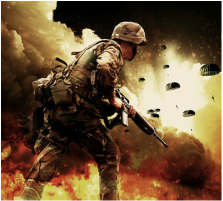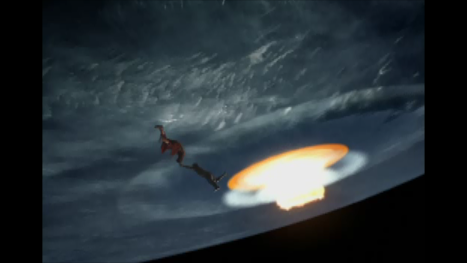
When it comes to weighing morality in fiction, different types of characters seem to be measured on very different scales.
Some character types can get away with things that others can't, while others can be subjected to far more violence with less moral outrage from the audience and other characters.
both in-universe and on the part of the audience:
1. Sparing the top villain is more important than sparing the underlings.
The heroes have done it. They've cut, burned, shot and bludgeoned their way through the enemy horde, and they've finally reached the person behind it all. The one who's been sending all the minor enemies into battle.
The one person whose death would make the biggest difference toward ending the conflict for good.
But... "No, you can't! Killing is wrong! If you kill him, you'll be just like him! You're the good guy - you're supposed to be a role model of mercy for all the impressionable children watching this!"
The fact that they just killed dozens, if not hundreds, of underlings in order to get to this guy might not even be mentioned. Those guys are generic and disposable. (Yes, I'm looking at you, movie adaptation of Prince Caspian.)
But Heaven forbid that the heroes kill a NAMED villain with a personality. That would be un-heroic! They should stick to slaughtering the nameless, preferably masked or helmet-wearing underlings who are more easily dehumanized - that's just fine.
And if a few hundred or thousand more civilians have to die, because the important villain was allowed to continue their villainy a bit longer?
That's just the price of family-friendly villain handling.
2. One protagonist is worth more than ALL the 'bad guys'.
When a protagonist dies or gets hurt, there's drama. There's sadness. There are images of loved ones mourning or worrying, woeful music, and unhappy feelings in the audience.
But when an entire enemy base gets blown up, it's awesome. The light show is great, the music sings of heroism, and the corpses and bereaved loved ones are probably not shown.
If this destruction was critical to preventing the enemy from launching a campaign of violence, the reaction makes sense. But what if most of the people on that base were just living their lives and doing their jobs, with no malicious intent...
And what if the people who were killed outnumber the people who were saved?
3. Revenge is only OK for (some) protagonists.
Whether or not revenge is endorsed depends heavily on the writer, but if the person taking revenge is an antagonist, you can probably count on it being portrayed as tragic at best, or evil at worst.
On the other side of the coin, there are times when minor characters are created and killed specifically to give the protagonist a reason to seek revenge.
In the case of a heroic avenger, sometimes it will be pointed out that revenge won't revive the dead or give the vengeful party closure. But the odds of revenge being painted as a worthy and heroic goal are a whole lot better if you're the protagonist.
4. Fighting dirty vs teamwork.
Sometimes, a hero being drowned in a zerg rush of minor enemies is just a chance for them to show how badass they are. Sometimes, it's a portrayal of how the enemy is willing to fight dirty by ganging up on a lone victim.
But how often do you see a villainous team-up being portrayed as the Power of Friendship and Teamwork in action?
Granted, the fact that they're villains makes them less likely than a hero to be motivated by camaraderie.
But I don't think I've ever seen a collaboration of antagonists being celebrated in-story the way a heroic loner is when they finally swallow their pride and allow their friends to help out.
Have you noticed any other double standards when it comes to fictional violence?
I look forward to reading your comments.

 RSS Feed
RSS Feed